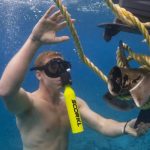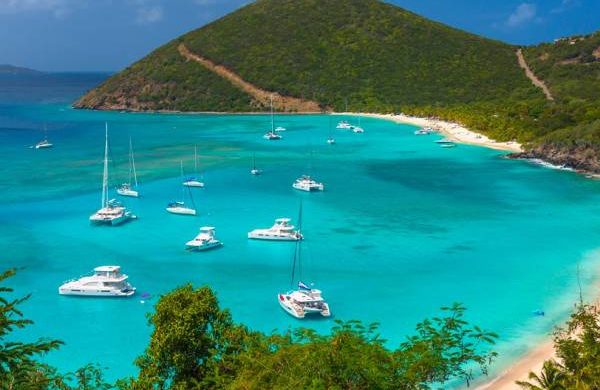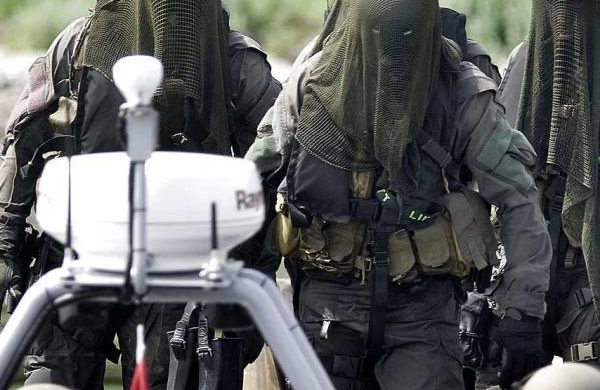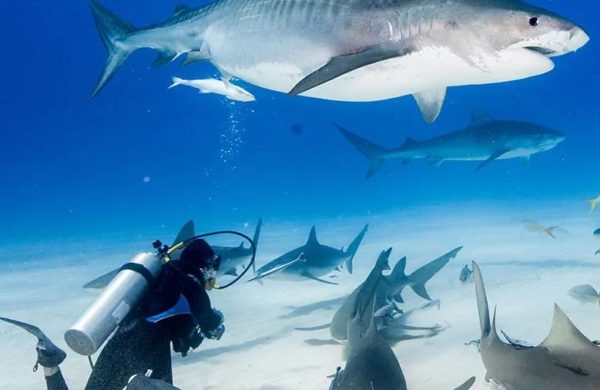
Lauren Mowery
Fijian dive sites still teem with beautiful fish and coral.
Yesterday, Donald Trump withdrew from the Paris climate agreement. Donald Trump — not all Americans. In fact, the majority of the U.S. wanted to remain in the accord. Politics aside, while nobody yet knows the true impact of this potentially fateful decision, scientists have already modeled a variety of detrimental repercussions from preventing a global temperature increase of 2 degrees. In some areas of the world, the effects of climate change are real and evident. Consider our ocean reef systems.
As a 17-year open water diver certified by PADI (Professional Association of Diving Instructors), I’ve witnessed the rapid degradation of our coral reefs. Gray, broken, and dead. Dwindling schools of colorful fish. Increasingly, that description fits a large number of dive sites around the world. Last month, I dove in the Bahamas. Not long after, Nevis. After we surfaced near St. Kitts, the dive master admitted nearly 80% of the surrounding coral was declared lifeless. Confirming these anecdotal impressions was the recent news about the Great Barrier Reef: In the last two decades, the 25 million-year-old ecosystem has bleached to the point of fear for its total and complete extinction.
Twenty. Years.
While the ramifications of a dying ocean far outweigh the interests of a sport, the question should still be asked: what will happen to SCUBA (Self-Contained Underwater Breathing Apparatus) diving if our coral reefs are dead?
I contacted the PADI organization for their thoughts on the looming crisis. Divers serve as one class of guardian to our aquatic habitats, bearing witness to changes while vested in their protection. I connected with Dr. Drew Richardson, President and CEO, PADI Worldwide. He’s been with PADI for thirty years, diving since 1971. “I’ve been lucky enough to have dived on all continents and both the Arctic and Antarctic polar ice environments. I love the adventure and exploration diving offers” he said.
I posed a few questions in the interview, touching on dive community responsibility, science and innovation, and great places to still experience the beauty of our underwater world. Fortunately, the answers aren’t as gloomy as you’d expect. I’ve published the interview in its entirety, below.
Climate change, ocean warming, acidification, and bleaching events are killing our reefs. Given the current pace of decline, what do you think is the future of the sport?
Unquestionably, there are serious and formidable issues threating the world’s coral reefs. That said, I’m a firm believer in engagement, problem identification and mitigation. My life philosophy is to remain optimistic and focused on a “future hope”. In my mind, there is no other option. Hope is the anchor to the soul. The danger is that we lose hope, or we feel like there’s nothing to be done.
In the wake of our 50th anniversary at PADI, we have deepened our commitment to ocean health and conservation. Our 25 million divers across the planet are becoming active as a force for good and driving towards a healthier planet and healthier reefs on local, national and international levels.
The PADI organization is committed to being a global force for good. We are passionate about creating a preferred view of the future in healthier oceans.
As the largest diver training organization in the world, PADI has the reach and influence to mobilize divers to be citizen activists. We train one million new divers each year across the planet who can engage in strategic alliances, have a powerful voice and get involved in real solutions to drive change.
As for the future of the sport of scuba diving, I feel there are strong tailwinds which will drive future growth in scuba diving. These include a growing middle class, a strong interest in adventure/action sports, strong global tourism trends, and environmentally conscious millennials to name a few. We are all about a future of engaging millions of new divers, training them well to be confident and comfortable divers, encouraging and enabling them to seek diving adventure and exploration of the planet’s underwater realm and paying it forward as good stewards of ocean and marine life health.
Baselines on coral reef communities may shift due to a variety of drivers, but there will be a strong and growing interest in underwater exploration and immersion- it’s a transformational and life-changing personal journey that we look forward to offering up to the planet for decades to come.

Lauren Mowery
Diving the Blue Lagoon in Fiji.
What can divers do to help, whether in their personal lives or within the framework of the sport?
Loads. Start with the “man in the mirror”, stay informed and do what you can to make the world a better place and become a more powerful catalyst for change. We already are seeing this in thousands of individuals on a local level and we are helping to get their messages out. All of us who care about these issues can amplify engagement efforts to support life below the waters of this world and support initiatives which promote the sustainable use of oceans, seas and marine resources. We encourage divers to align with like-minded business and organizations. The diving community will become powerful change agents who share a like-minded love, mission and passion to be a force for good and tackle and mitigate the problems which threaten our ocean planet.
Local fishing practices and pollution are other contributors to reef decline. What can divers do to positively impact those practices?
Stay informed, get engaged, initiate conversations and educate others about the issues. We all can make informed choices about how we live our lives, what we eat who we do business with etc. We can support set asides, marine protected areas and hope spots and support sustainable development and life practices. Support the development of social norms and institutions that allow the responsible management of reefs. Policy-makers might help local communities and people live with reefs sustainably, and encourage people to be more invested in their local reefs. We don’t get to live in an ideal world, we live in this one.
You’ve likely read about 3-D reefs. What’s your thought on how quickly those can be created to contribute to reef health and regeneration? What else may help, if anything?
I love the innovation and hope that is driving this initiative. Artificial reefs have been around a long time with mixed success. Time will tell if 3-D reefs can help restore on any longer-term or mass scale.
What dive areas are still in good shape for viewing colorful fish and a lively reef?
There are hundreds across the planet. As for tropical marine ecosystems-places like Palau, Sipadan, Papua New Guinea, Fiji, Indonesia and the Philippines. In the Caribbean Bonaire, Saba, much of the Bahamas, Las Rocas, and many areas in the Red Sea and the Maldives. There remains much beauty to be seen.
When she’s not in a vineyard or the ocean, Lauren Mowery covers drinks, food & adventure/luxury travel. Follow her around the world on Instagram and Twitter.





